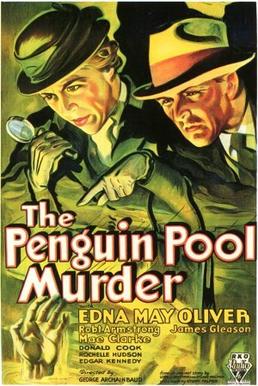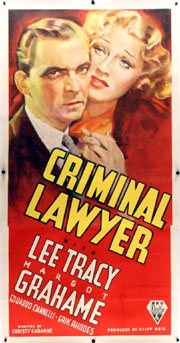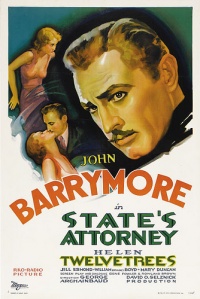
A Free Soul is a 1931 American pre-Code drama film directed by Clarence Brown and starring Norma Shearer, Leslie Howard, Lionel Barrymore and Clark Gable.

Gwen Amber Rose Araujo was an American teenager who was murdered in Newark, California, at the age of 17. She was murdered by four men, two of whom she had been sexually intimate with, who beat and strangled her after discovering that she was transgender. Two of the defendants were convicted of second-degree murder, but not the requested hate-crime enhancements to the charges. The other two defendants pleaded guilty or no-contest to voluntary manslaughter. In at least one of the trials, a "trans panic defense"—an extension of the gay panic defense—was employed.

Rubin "Hurricane" Carter was an American-Canadian middleweight boxer who was wrongfully convicted and imprisoned for murder, until released following a petition of habeas corpus after almost 20 years in prison.

The Scottsboro Boys were nine African American male teenagers accused of raping two white women in 1931. The landmark set of legal cases from this incident dealt with racism and the right to a fair trial. The cases included a lynch mob before the suspects had been indicted, all-white juries, rushed trials, and disruptive mobs. It is commonly cited as an example of a legal injustice in the United States legal system.

Leo Max Frank was an American lynching victim convicted in 1913 of the murder of 13-year-old Mary Phagan, an employee in a factory in Atlanta, Georgia where he was the superintendent. Frank's trial, conviction, and unsuccessful appeals attracted national attention. His kidnapping from prison and lynching became the focus of social, regional, political, and racial concerns, particularly regarding antisemitism. Modern researchers generally agree that Frank was wrongly convicted.

Twilight of Honor, released in the UK as The Charge is Murder, is a 1963 American neo noir crime film directed by Boris Sagal and starring Richard Chamberlain, Nick Adams, Claude Rains, and featuring Joey Heatherton and Linda Evans in their film debuts. Twilight of Honor is a courtroom drama based on Al Dewlen's novel, with a screenplay by Henry Denker. Like the 1959 courtroom drama Anatomy of a Murder, it continued a recent trend of descriptions of things previously never mentioned in American cinema, such as vivid accounts of sexual assault, adultery, and prostitution.

Murder One is an American legal drama television series that aired on ABC from September 19, 1995, until May 29, 1997. The series was created by Steven Bochco, Charles H. Eglee, and Channing Gibson.

They Won't Believe Me is a 1947 American film noir directed by Irving Pichel and starring Robert Young, Susan Hayward and Jane Greer. It was produced by Alfred Hitchcock's longtime assistant and collaborator, Joan Harrison. The film was made and distributed by Hollywood major studio RKO Pictures.

They Drive by Night is a 1940 American film noir directed by Raoul Walsh and starring George Raft, Ann Sheridan, Ida Lupino, and Humphrey Bogart, and featuring Gale Page, Alan Hale, Roscoe Karns, John Litel and George Tobias. The picture involves a pair of embattled truck drivers and was released in the UK under the title The Road to Frisco. The film was based on A. I. Bezzerides' 1938 novel Long Haul, which was later reprinted under the title They Drive by Night to capitalize on the success of the film.
Shareef Cousin is an African-American man from New Orleans who was convicted of the first-degree murder of Michael Gerardi in 1996 and sentenced to death as a juvenile in Louisiana. At age 17, he became the youngest condemned convict to be put on death row in Louisiana, and one of the youngest in the United States.

The Penguin Pool Murder is a 1932 American pre-Code comedy/mystery film starring Edna May Oliver as Hildegarde Withers, a witness in a murder case at the New York Aquarium, with James Gleason as the police inspector in charge of the case, who investigates with her unwanted help, and Robert Armstrong as an attorney representing Mae Clarke, the wife of the victim. Oliver's appearance was the first film appearance of the character of Hildegarde Withers, the schoolteacher and sleuth based on the character from the 1931 novel The Penguin Pool Murder by Stuart Palmer. It is the first in a trilogy including Murder on the Blackboard, and Murder on a Honeymoon, in which Oliver and Gleason team up for the lead roles.

Lawrence Fobes King, also known as Latisha King, was a 15-year-old student at E.O. Green Junior High School in Oxnard, California, who was shot twice by a fellow student, 14-year-old Brandon McInerney, and kept on life support for two days afterwards.

The Unguarded Hour is a 1936 American drama film directed by Sam Wood and starring Loretta Young, Franchot Tone and Roland Young. In England, a prominent young prosecutor in a murder trial is unaware that his wife is involved.

Smart Woman is a 1948 American romantic drama film directed by Edward A. Blatt and starring Brian Aherne, Constance Bennett, and Barry Sullivan.

Travis Victor Alexander was an American salesman who was murdered by his ex-girlfriend, Jodi Ann Arias, in his house in Mesa, Arizona while in the shower. Arias was convicted of first-degree murder on May 8, 2013, and sentenced to life in prison without the possibility of parole on April 13, 2015.
State of Florida v. George Zimmerman was a criminal prosecution of George Zimmerman on the charge of second-degree murder stemming from the killing of Trayvon Martin on February 26, 2012.

The Secret Bride is a 1934 American drama film directed by William Dieterle and starring Barbara Stanwyck and Warren William. Based on the play Concealment by Leonard Ide, the film is about the attorney general of an unnamed state and the daughter of the governor who are forced to keep their recent elopement secret after the governor is accused of a crime. The initial plot concerns the governor taking a bribe in exchange for pardoning a white collar criminal. The investigation is about political corruption.
On November 23, 2012, Jordan Davis, a black American 17-year-old boy, was murdered at a Gate Petroleum gas station in Jacksonville, Florida, United States, by Michael David Dunn, a white 45-year-old software developer, following an argument over loud music played by Davis and his three friends, in what was believed to be a racially motivated shooting.

Criminal Lawyer is a 1937 American drama film directed by Christy Cabanne from a screenplay by G. V. Atwater and Thomas Lennon, based on a story by Louis Stevens. The film stars Lee Tracy, Margot Grahame and Eduardo Ciannelli. RKO produced the film and premiered it on January 26, 1937, in New York City, with a national release a few days later on January 29. It was the second time Stevens' story had been used for a film, the first being 1932's State's Attorney, starring John Barrymore and Helen Twelvetrees, directed by George Archainbaud, and also produced and released by RKO.

On March 3, 1993, Saint Joseph Academy high school senior Albert Joseph "Joey" Fischer Jr. was shot dead outside his home in Rancho Viejo, an upscale community north of Brownsville, Texas. Dora Cisneros, the mother of his ex-girlfriend, was responsible for orchestrating Fischer's murder after he broke up with her daughter Cristina. Fischer and Cristina had broken up the previous summer, but Cisneros became obsessed with their relationship and insisted that Fischer date her daughter again. After he refused a US$500 offer from Cisneros, she consulted María Mercedes Martínez, a fortune teller, to cast a spell on him.
















